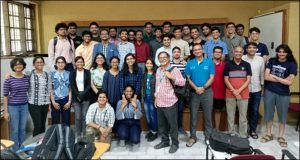
What is a paradox? In Logic, Language, and the Liar Paradox, Martin Pleitz defines a paradox as “an argument that appears to be valid from premises that appear to be true to a conclusion that appears to be unacceptable”. For example, the Liar Paradox declares, “This statement is false” or “This statement is not true”. Another famous paradox is the Socratic Paradox—supposed to have been derived from his reported thoughts in Plato’s Apology—”I know that I know nothing!”
Some other common paradoxical statements are “This is the beginning of the end.” and “Deep down, you are really shallow!” Professor Pandu Rangan, Chair Visiting Professor at the Kotak IISc AI- ML Centre (KIAC), offers a simpler explanation of a paradox: “a situation or a math statement, where the statement as well as its opposite are both true”. He says that “on the first look, it may sound absurd but there will be a hidden logical ‘log jam’ that produces a surprise or amusement about a paradox. In our daily life, we often hear the statement ‘every rule has an exception’. Do you realise that this is an impossible statement and there is a logical mess here? Think carefully! What is the exception to this rule? A rule that has no exception. But then, such a rule will be contradictory to our initial statement!”
While learning about the foundations of set theory, axiomatic approach, and formal proof of correctness in Pandu Rangan’s course—Discrete Mathematics—the undergraduate students of the BTech (Mathematics and Computing) programme at the Indian Institute of Science (IISc) were excited about paradoxes. They teamed up to put up a delightful show with presentations on world-famous paradoxes on 14 May, 2023. The Fest was organised by Databased, ACM–W IISc Student Chapter, and KIAC.
Databased is the computer science crew at IISc. It is a community of students passionate about diving deep into the world of computer science and exploring the domain of mathematics. It is headed by Musavir Khaliq, an MTech student at the Department of Computer Science and Automation (CSA) and is run by students of the BTech (Mathematics and Computing) programme under the supervision of Professor Chiranjib Bhattacharyya (Chair, CSA).
The ACM–W IISc Student Chapter is an organisation under the Association for Computing Machinery that unites a community of enthusiastic students who share a profound interest in delving into the realm of computing and its interconnected fields and providing support to women in the computing field by creating opportunities for networking, mentoring, and bonding over common interests. The primary objective is to foster expertise in computing and provide an extensive platform to empower women in this industry with in-house events and community services.
During the Fest, the students presented eleven paradoxes.
